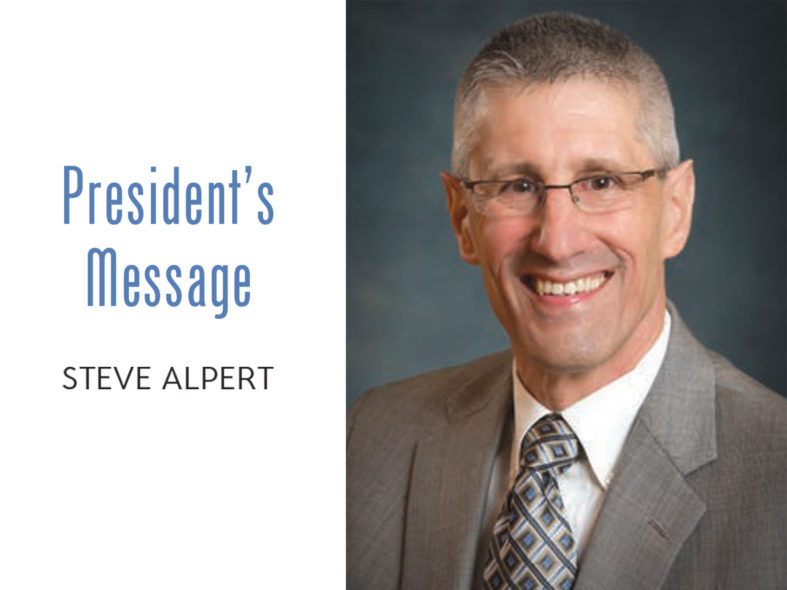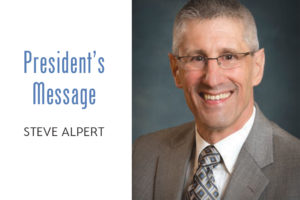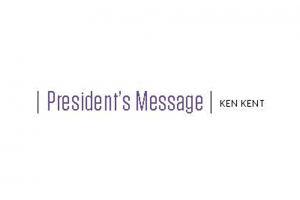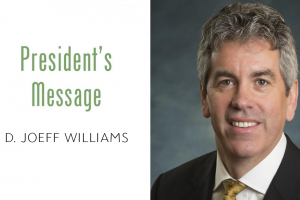By Steve Alpert
A year ago, in my inaugural address as Academy president, I challenged the profession to engage in a dialogue about how the public values the contributions of the actuarial profession and how actuarial professionalism guides us in navigating the dynamic relationship among the public, the principal, and the profession.
That relationship is defined on one side by the expectations of the public—fairness in defining and obtaining financial security, and the ability to trust the actuarial profession and the services it provides. On the other side, it is defined by the profession’s efforts to create standards of conduct, qualification, and practice through transparent institutions and processes and to enforce them in a manner that is worthy of the public’s trust. The effectiveness of the U.S. actuarial professionalism infrastructure is broadly recognized as the reason why the profession has been able to maintain its self-regulating status.
In September, I described the Academy as the fulcrum of the profession’s self-regulation because the Academy is structured to provide independence and credibility to the infrastructure of actuarial professionalism, such as the Actuarial Standards Board and the Actuarial Board for Counseling and Discipline. Balanced on either side of this fulcrum are actuaries’ individual actions on the one hand, and the expectations and needs of our many publics on the other. If self-regulation is to be effective, all three parts must be balanced and in harmony: The Academy’s fulcrum must be at the right point, public needs and expectations must be appropriately identified, and individual actuaries must do the right things consistent with both. When all three parts are aligned and complement each other, self-regulation becomes a strong and sustainable ecosystem.
This article will focus on the third part of the ecosystem of the profession’s self-regulation: the role of individual actuaries in doing the right thing every day and being recognized for doing so. This role is critical because each of our “publics”—employers, clients, regulators, the general public, other actuaries, and members of other professions—is ever-vigilant about what members of our profession are contributing to individual projects and to the overall well-being of various financial security systems. Their judgment and perception of the entire profession is based on the sum of their experiences with individual actuaries.
This is why the burden of professionalism—the combination of technical skill defined by standards of qualification and practice and ethical behavior defined by the Code of Professional Conduct—must rest on the shoulders of each individual actuary. This burden is not new, and it’s not limited to the actuarial profession. Consider the example discussed by Plato when Socrates questioned various men in Athens who had achieved success because of their great technical skill but had conflated technical skill “with excellence of the soul.”
[B]y pursuing their professions to the exclusion of developing their souls, these men find themselves with skills, money, and popular esteem but no sense of moral direction by which to guide the use of their practical expertise. Plato illustrates this conflict repeatedly with the example of a doctor whose skills make him equally qualified to help or harm his patients.”[1]In other words, the fact that we, as qualified professionals, have specialized knowledge does not by itself garner trust. It is the combination of specialized knowledge and an ethical compass pointing us in the right direction that permits trust. As one scholar observed:
Professionals cannot escape ethical considerations due to the asymmetry of their knowledge and the attendant power such knowledge brings. Knowledge and its applications may be put to uses of good or evil. It is up to the professionals to safeguard that knowledge not only through exclusivity and credentialing, but by ethical refusal to use their knowledge or allow it to be used in ways that harm or do not help humanity. Ethics are the essence of professionalism.”[2]
The Academy, representing the profession as a whole, has an important role to play in defining standards that embrace and foster technical excellence and ethical behavior. These standards of professionalism apply to the individual actuary and do not fall on the shoulders of the actuary’s clients, employers, or anyone else. The Academy, through the ABCD, can provide sources of guidance and credible counseling and enforcement, but the rest is up to each one of us: We need to get it right every day.
You do not have to look far for evidence of the individual responsibility of each actuary. It’s right there in Precept 1, at the very beginning of the Code of Professional Conduct: “An actuary shall act honestly, with integrity and competence, and in a manner to fulfill the profession’s responsibility to the public and to uphold the reputation of the actuarial profession.” In fact, each of the ethical actions in the 14 precepts of the code begin with the words “An actuary shall.” The Code describes the Precepts as the “professional and ethical standards with which an Actuary must comply in order to fulfill the Actuary’s responsibility to the public and to the actuarial profession.”[3] This is the keystone that holds together the whole system of self-regulation and public trust. Without the daily ethical behavior of individual actuaries “getting it right,” the whole interdependent system of a self-regulating profession would be at risk.
Getting it right must be what each actuary does every day in every interaction. This is why an actuarial communication must clearly identify the actuary who prepared it and is responsible for its contens.[4] Through this process, an actuary should feel a sense of accountability and ownership. Getting it right also means that while we are each responsible for our own actions, we also each have a responsibility to the profession under Precept 13 if we have knowledge of an apparent, unresolved, material violation of the Code by another actuary. If standards are to be meaningful, counseling and discipline are essential. An incompetent or unethical actuary can leave the public with a bad impression of the actuarial profession as a whole.
In the end, while the relationship among individual professionals, the profession, and the public is dynamic and constantly evolving, it is the individual practicing actuary that keeps the ecosystem of self-regulation and the public’s trust in the profession in balance. The Academy and its professionalism bodies can show the individual actuary the path, but the individual actuary must walk it.
So, my parting words are simple and heartfelt: Do the right thing, and do it with excellence. By doing so, you will help to shape the impressions the non-actuarial world has of our profession as a whole. You build trust with the public and demonstrate that the profession adds value. Put another way, each of us should take pride in what we do as individuals and as representatives of a true profession.
References
[1] Reid, The Educational Value of Plato’s Early Socratic Dialogues, p 3. [2] Beaton, Why Professionalism is Still Relevant, January 2010, p 19. [3] Code, introduction, emphasis added. [4] Code, Annotation 4-1.




